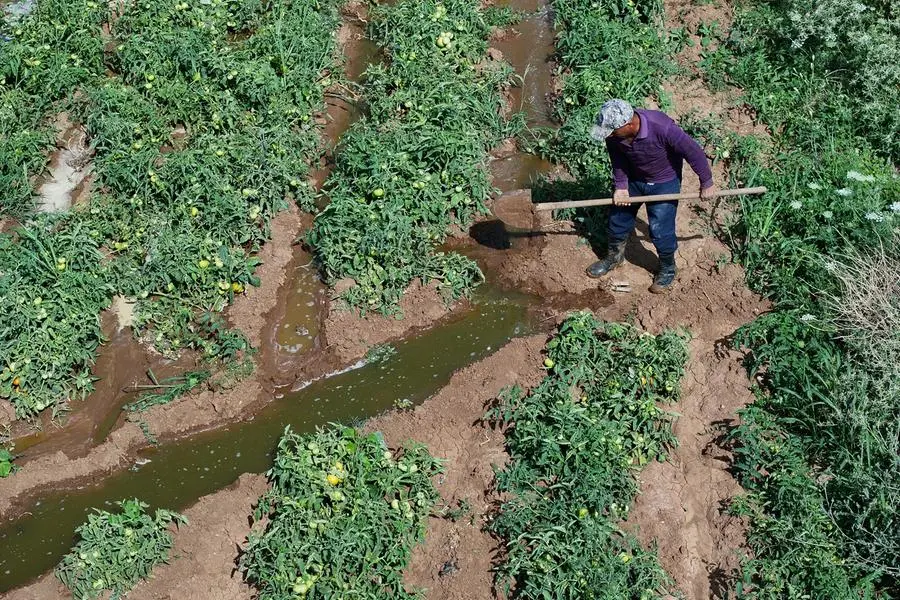PHOTO
For the first time in over a decade of conflict, farmers in Syria's rebel-held northwest are irrigating their crops more easily thanks to the rehabilitation of a vital reservoir, bringing life back to parched fields.
Water from the Bala reservoir is once again flowing to a fertile plain in the Idlib area, home to several million people, many of them displaced during the country's devastating civil war.
"More than 10 years ago, water stopped flowing into the reservoir because of a lack of electricity" for the pumps, said Mohammed Ramadan, 42, irrigating his crops in the village of Bala.
Farmers have relied on rainwater ever since, but it was never enough for their crops to thrive, he added.
"Now, thank God, water is flowing again," he told AFP, with farmers diversifying their crops to include vegetables like eggplant and peppers rather than just the bare essentials.
The reservoir went back into service after years of problems, including poor maintenance and damage to some of its facilities due to bombardment.
Pumps at a nearby station were repaired and reconnected to the electricity grid, while other cleaning and maintenance work was also carried out, according to the authorities.
It collects rainwater in the winter, while water is also pumped in from the Orontes River area nearby.
Agriculture is the main source of income for many in the roughly 60 villages in the Rouj plain, a vast patchwork of green and golden crops cutting rectangular shapes around the reservoir.
"When water began to flow again, the entire Rouj area was revived," Ramadan said, pumping water from a nearby canal.
- 'Where will our sheep graze?' -
Livestock grazed near the reservoir's edge, while children swam in an adjoining canal.
"We were limited to growing beans and tomatoes" before the reservoir was rehabilitated, said farmer Walid Mohammadia, 40, as he harvested zucchinis.
"But today we can grow crops that we couldn't afford to plant before," he said, visibly excited.
"When water flowed again, life returned," he added.
The reservoir has a maximum storage capacity of 14.5 million cubic metres (512 million cubic feet), said Tammam al-Hamud, an official in charge of water resources.
The Syrian war erupted from 2011 anti-regime protests and evolved into a complex conflict involving international powers and proxies. More than half a million people lost their lives, with millions displaced.
Jihadist group Hayat Tahrir al-Sham, led by Syria's former Al-Qaeda affiliate, and affiliated armed factions run the Idlib bastion, which also includes slivers of neighbouring Hama, Aleppo and Latakia provinces.
When the renovation project -- expected to cost around $2.5 million -- is fully completed, the reservoir will be able to irrigate more than 10,000 hectares of farmland, compared to about 4,000 hectares currently, Hamud added.
He expressed hope the stores would help increase crop yields, especially for more water-intensive cotton, whose cultivation is crucial "because it provides raw material for factories" that employ many people in the region.
Jihad al-Sawaq, an official in charge of pumping stations in the area, said the aim of repairing the reservoir was to "increase the irrigated areas to boost crop production".
"We will encourage planting several strategic types of crops including sugar beets, sunflowers and soybeans, which we had stopped producing in 2011," he said.
But not everybody is happy with the project.
"Our sheep used to graze inside the reservoir, and now it's filled with water," said shepherd Zakwan al-Hamdun, 53, who lives in a nearby displacement camp.
"Where will our sheep graze now?" he asked, his livestock nibbling on meagre tufts of grass between the camp's tents.
"We want the (local) government to at least help by providing fodder," he added.




















